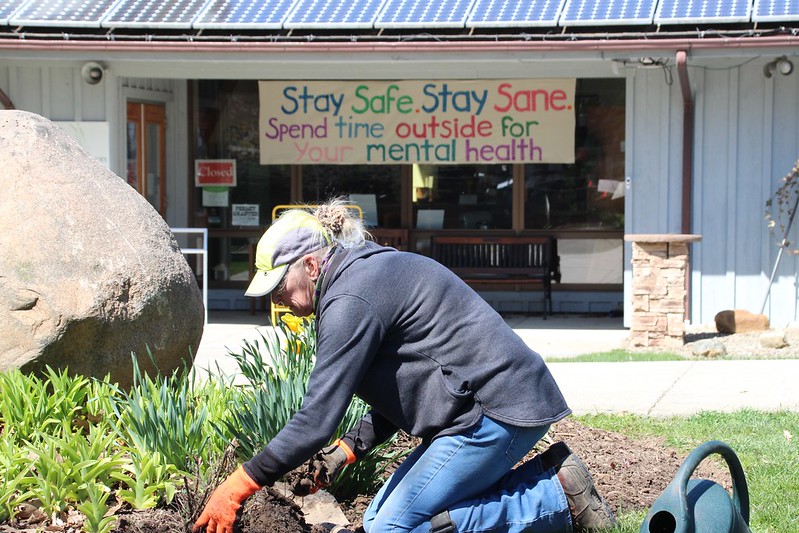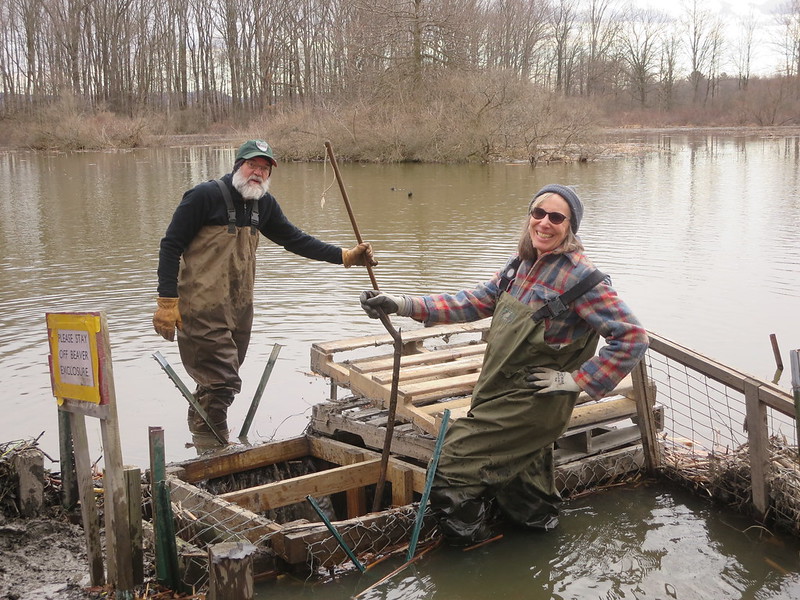Audubon Community Nature Center feels dead inside. The doors are locked. The lights are off. Heat is only on in the office and for the live animals in order to save money. It is cool, dark, and echoes with that odd quiet of places that are abandoned.
Frankly, while there are still staff that come in to feed the animals and care for the trails, the heart of Audubon is missing: volunteers. Volunteers have been a huge part of Audubon ever since it was founded in 1956. There are weekly volunteers that were already helping out when I started working at Audubon twenty-four years ago and, until COVID-19, continued to come.
These volunteers are more than a part of Audubon’s community. They are family. It is a group that has coffee and eats together, that helps each other out, and that accomplishes an amazing amount of work.
Recently, I started working on the grounds to help Terry, the Buildings and Grounds Manager, twice a week to keep up the trails. In theory, the two of us are replacing a crew of six to eight or more volunteers that generously donate their time to helping out twice a week There is no way we can keep up, but we try.
The first thing we do is hop on the tractor and drive out to remove debris that industrious beavers have used to plug the pipes that drain Audubon’s ponds. One pipe drains almost all of the ponds at Audubon to the Conewango Creek and, when it is plugged, the water backs up and floods the trails. It is always plugged.
And so, first thing, I pull on a pair of slightly leaky waders and jump in the pond. It doesn’t matter if it is nice, raining, freezing, or snowing. The pipe has to be cleared of debris. It gave me a new appreciation for volunteers that normally do this without getting paid other than thank yous and coffee.
It’s a job that is oddly fulfilling. There is a sense of accomplishment to hearing the water start to flow through the pipe and slowly watch a mini whirlpool form above it as water drains through. I have pulled all kinds of interesting things out of the pipes, from the expected sticks and mud to rocks and even a minnow trap.
There is no way, though, that the two of us is a match for the crew that normally shows up. First of all, they can back up a trailer, a skill that continues to elude me, though I am sure it is amusing to watch as the trailer goes in exactly the wrong direction every time I back up. Second, there is really no way two people can keep up with a hard working crew or the comradery of people that have volunteered together for years. Inevitably, things are going to start slipping through the cracks.

The maintenance crew isn’t the only place Audubon is shorthanded. Over the years, we have worked hard to use volunteers in jobs they are skilled or passionate at. This includes everything from processing memberships to caring for Audubon’s animals, even making up the weekly deposit and putting labels on the upcoming May-June newsletter. If there was a job that a volunteer could do, someone stepped up to do it. This freed Audubon staff up to fulfill our mission of helping people form a real and healthy connection to nature through education, event planning, fundraisers, exhibit design, and more. Without volunteers, our staff is working harder and more creatively than ever to make sure all those jobs formerly done by volunteers get done.
Over time, volunteers have started working as many hours at Audubon collectively as our staff does. With COVID-19, volunteers have been asked, for the most part, to stop volunteering for everyone’s safety. It is like having a large chunk of the family evaporate from the organization.
The long and short of it is that Audubon volunteers are more than volunteers. They are family and we all miss them. It is as hard to go weeks without volunteers as it is to not see family for weeks on end or, worse, to see them and not be able to get close to them. I know that volunteers are staying away for the sake of safety and that staff is limited for the same reason, but that makes it not one bit easier. We are all waiting for this crisis to end, not just to get back to a more normal life, but to meet up again with volunteers at the other side.
For those of you reading this that are volunteers, know this: we think of you every day that we walk into the cold, dark, empty Nature Center. We think of you every time we do a job that you would have done, and that happens numerous times a day. We look at the coffee pot, now unplugged to save energy, and think of having coffee downstairs as a group at the Nature Center. We are struggling without your help, but we are eking by, keeping the place going so we all have a place to return to. We cannot wait to celebrate all that you mean to us at our next big volunteer event on the other side.
For those of you who are not volunteers, but have been hiking the trails at Audubon in these troubling times, thank you to those who have helped pick up litter and toss branches off of the trails. It makes the job of our limited staff so much easier. We are excited to see you using our trails.
I would like to end this article with words that we posted on the outside of the Nature Center. Stay safe. Stay sane. Remember that time outside is good for your mental and emotional health.
Audubon Community Nature Center builds and nurtures connections between people and nature. ACNC is located just east of Route 62 between Warren and Jamestown. The trails are still open from dawn to dusk as is Liberty, the Bald Eagle. Though the Nature Center is currently closed, including restrooms, due to COVID-19 restrictions, drive-thru sales are available from the Blue Heron Gift Shop. More information can be found online at auduboncnc.org or by calling (716) 569-2345.


Recent Comments